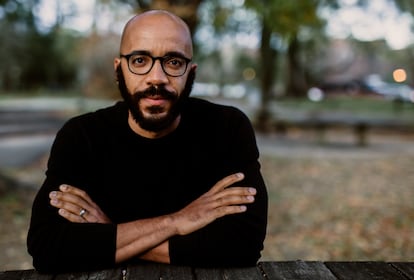Clint Smith, writer: ‘It is impossible to understand the US economy without slavery’
The New Orleans academic invites readers to discover his country’s past in his book ‘How the Word Is Passed: A Reckoning with the History of Slavery Across America’

“My grandfather’s grandfather was enslaved.” This is how writer and academic Clint Smith, 36, begins the epilogue of his book How the Word Is Passed: A Reckoning with the History of Slavery Across America.
The ties to that history aren’t so far in the past, yet those in power have been quick to overlook the deep human tragedy of slavery. Smith examines street names and questions the figures behind the monuments of New Orleans, New York, and Dakar in an effort to trace the roots of inequality.
Traffickers and politicians appear within the pages of a book that invites readers to unravel the unanswered questions of a history that was never written by the oppressed.
With a U.S. president who has ordered an “ideological” purge of the Smithsonian museums and a “restoration” of U.S. history, Smith’s voice feels more urgent than ever.
“I’m concerned about a country that’s in some way heading toward fascism, where the executive branch tries to dictate what should and shouldn’t be taught. That’s how authoritarianism works. And we have to fight it,” he said via videoconference from Maryland.
Question. How necessary is a book like this right now?
Answer. Extremely important. If you don’t understand the social, political, and economic impact that the history of slavery has had for centuries, you’ll assume that the reason for different levels of wealth, health, or academic outcomes is because of something wrong with the people themselves. But what the context teaches you is that it has nothing to do with them per se, but rather with the things that have been taken from them, extracted, and the opportunities they have been denied.
Q. What does it mean for the Trump administration to rewrite the historical narrative?
A. It’s deeply disturbing. An administration that conceives of patriotic education, so to speak, as something that ignores what we’ve done wrong is morally and intellectually reprehensible.
Q. What do you think the compensation and reparation process should look like?
A. If you have a group of people who have been intentionally, systemically, and structurally deprived of access to basic public benefits for centuries, you have to repair the damage. And not just by writing a check, but by multifactorial measures like compensating for discrimination and segregation, creating education projects, and also memory projects, to understand the origins of inequality.
Q. In your book, a professor from Senegal reflects on the idea that white sugar brings Black misfortune. How do you connect slavery to capitalism?
A. Something I think about constantly is that in 1860, in the United States, the four million enslaved Black people were worth more than all the banks, factories, and railroads combined. It’s impossible to understand the development of the American economy as the world’s leading economic superpower without slavery. It’s a story very similar to that of colonialism.
Q. Both slavery and colonialism took place in Europe as well.
A. Many European countries developed at the expense of others, mainly African countries. And exploitation is also why much of Africa struggles with poverty today while Europe prospers.
Q. How would it be helpful to learn more about these dynamics to manage migration?
A. It is misleading to suggest that the history of colonialism and European exploitation of African nations has nothing to do with migration patterns.
Q. How did you feel entering the dungeon known as the ”Recalcitrant Cell,” which was used to imprison enslaved people who resisted being trafficked, on Gorée Island in Dakar?
A. Being in the same place where my ancestors may have been captured is a moving and powerful experience. We are of African descent, but we can’t know which community they come from. I don’t know if my family is from Ghana, Senegal, Gambia, Mauritania, or Togo; there’s simply no way to know that information, and certainly no way to trace it back to a community in that area. That experience is as close as I can get to our past.
Q. How does it feel to be a descendant of an enslaved family?
A. I’m very proud to come from people who overcame more than I could have ever imagined. They fought for freedom, for emancipation, for liberation. And the vast majority of them never had the chance to enjoy this, but they fought anyway because they knew that one day someone would. And I think that my life and my children’s lives are only possible because of them. This makes me think about my responsibility: to try to build a better world, to create more opportunities for my people, my community.
Q. The book is like an invitation for each person to question and consider who is behind each monument or street name. Was that the intention?
A. Absolutely. It’s meant to be an invitation, not a lecture or some kind of condemnation. This book began because I grew up in New Orleans, the key city of the slave trade, and I am a descendant of enslaved people. And yet, I realized I didn’t understand the history of slavery in a way that was commensurate with the impact and legacy it left on this country. This book was a desire and an opportunity to learn on my own everything I wish I had been taught growing up.
Sign up for our weekly newsletter to get more English-language news coverage from EL PAÍS USA Edition
Tu suscripción se está usando en otro dispositivo
¿Quieres añadir otro usuario a tu suscripción?
Si continúas leyendo en este dispositivo, no se podrá leer en el otro.
FlechaTu suscripción se está usando en otro dispositivo y solo puedes acceder a EL PAÍS desde un dispositivo a la vez.
Si quieres compartir tu cuenta, cambia tu suscripción a la modalidad Premium, así podrás añadir otro usuario. Cada uno accederá con su propia cuenta de email, lo que os permitirá personalizar vuestra experiencia en EL PAÍS.
¿Tienes una suscripción de empresa? Accede aquí para contratar más cuentas.
En el caso de no saber quién está usando tu cuenta, te recomendamos cambiar tu contraseña aquí.
Si decides continuar compartiendo tu cuenta, este mensaje se mostrará en tu dispositivo y en el de la otra persona que está usando tu cuenta de forma indefinida, afectando a tu experiencia de lectura. Puedes consultar aquí los términos y condiciones de la suscripción digital.









































